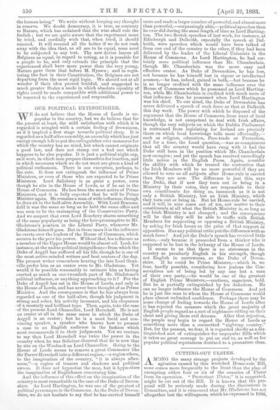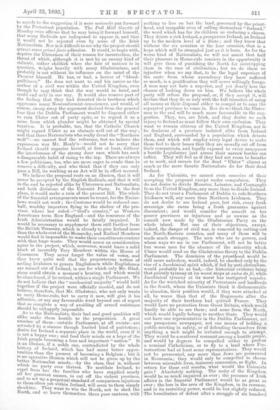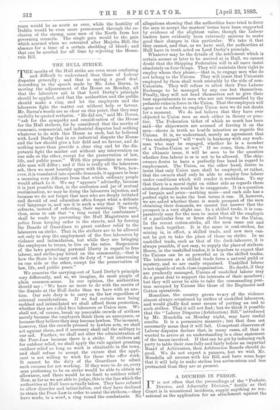CUTTING-OUT ULSTER. A MONG the many strange projects developed by the
agitation caused by this wretched Home-rule Bill, none comes more frequently to the front than the plan of exempting either four or six of the counties of Ulster from its operation. " Protestant Ulster," it is suggested, might be cut out of the Bill. It is known that the pro- posal will be seriously made during the discussions in Committee, and it is rumoured that Mr. Gladstone has not i altogether lost the willingness, which be expressed n 1886, to accede to the suggestion if it were seriously put forward by the Protestant population. The Pall Mall Gazette of Monday even affirms that he may bring it forward himself, that many Radicals are indisposed to oppose it, and that it would not be rejected even by some of the Irish Nationalists. Nor is it difficult to see why the project should attract some prima' facie adhesion. It would, to begin with, deprive the TJ1stermen of their reason for insurrection, the threat of which, although it is met by an uneasy kind of ridicule, rather childish when the fate of nations is in question, weighs heavily with many Glad stonians, and probably is not without its influence on the mind of the Premier himself. He has, or had, a horror of " blood- guiltiness." He does not want to end his career as the author of a civil war within the United Kingdom, even though he may think that the war would be brief, and could end only in one way. It would also remove part of the feeling that they had deserted their brethren which oppresses many Nonconformist consciences, and would, of course, sweep away the argument derived from the general fear that the Dublin Parliament would be disposed either to ruin Ulster out of party spite, or to regard it as a mine from which plunder might be obtained by special taxation. It is probable, too, that the Catholic Church might regard Ulster as an obstacle well out of the way ; and that those Nationalists who really dread the "Northern wolf "—we cannot find the reference, but we believe the expression was Mr. Healy's—would not be sorry that Ireland should organise herself, at first at least, without the interference of the strong dour race, which has such a disagreeable habit of rising to the top. There are always a few politicians, too, who are more eager to evade than to remove a difficulty, and who think that if they can only pass a Bill, its working as an Act will be in effect secured. We believe the proposal rests on an illusion, that it will never be accepted by the English Radicals, and that it will in the end, be rejected alike by Ulstermen and Nationalists, and both divisions of the Unionist Party. In the first place, it would make a ruin of the present Bill. The whole of the financial arrangements must be recast, for the Excise- laws would not work ; the Customs would be reduced one- half, wealthy importers flying to the shelter of the pro- vince where law ruled—" God's country," as Western Americans term New England—and the resources of the Irish Administration would be fatally impaired. It would be necessary to supplement them still further from the British Treasury, which is already to give Ireland more than the whole cost of the Monarchy, and Radical Members would find it impossible to make their constituents content with that huge waste. They would never on consideration agree to the project, which, moreover, would leave a solid block of incurably Tory Members within the House of Commons. They never forget the value of votes, and they know quite well that the preposterous notion of setting Irishmen to govern Englishmen while Englishmen are turned out of Ireland, is one for which only Mr. Glad- stone could obtain a moment's hearing, and which would be abandoned, if he retired, within a single Parliament. We do not believe that the "mechanical majority" wbuld hold together if the project were officially mooted, and do not believe, therefore, that Mr. Gladstone, who not only wants to carry Home-rule, but to carry it now, will give it his adhesion, or say any favourable word beyond one of regret that so complete a way of avoiding all armed resistance should be unhappily impossible. As to the Nationalists, their bad and good qualities will alike make them hostile to the proposition. A great number of them---outside Parliament., at all events—are actuated by a sincere though limited kind of patriotism; desire for Ireland a separate place in the world, even if it is not a happy one ; and feed their minds on a hope of the Irish people becoming a free and important "nation." It is an illusion, if a noble one, contradicted by the whole history of Ireland, which has had many better oppor- tunities than the present of becoming a Belgium ; but it is an operative illusion which will not be given up by the better Nationalist minds,—by the class, that is, without which no party ever thrives. To mutilate Ireland, to expel from her the families who have supplied nearly all her greatest names, to cut off the richest province, and to set up a perpetual standard of comparison injurious to themEelves yet within Ireland, will seem to them simply shocking. They want to win the North, not to shed the North, and so leave themselves three poor cantons, with nothing to live on but the land, governed by the priest- hood, and incapable even of calling themselves "Ireland," the word which has for its children so enduring a charm, They desire a rich Ireland, a prosperous Ireland, an Ireland up to the modern level of a State ; and they know that without the six counties or the four counties, that is a hope which will be strangled just as it is born. As for the worse kind of Nationalists, we will not assert that half their pleasure in Home-rule consists in the opportunity it will give them of punishing the North for outstripping them in the race of civilisation ; but we do them no injustice when we say that, to be the legal superiors of the caste from whose ascendency they have suffered so much, is a gratification they will never willingly forego. A man may not hate a superior, and yet dearly love the chance of looking down on him. We believe the whole party will refuse the proposal, or, if they accept it, will declare that they do so only with the full intention of using all means at their disposal either to compel or to coax the separated province to come in. Nor do we think the Ulster- men in the end will be much more favourable to the sug- gestion. They, too, are Irish, and they desire no such injury to Ireland as must follow their own exclusion. They want to remain citizens of the United Kingdom, not to be denizens of a province isolated alike from Ireland and England, surrounded by a population which detests them, and which will employ every legal device to make them feel to their bones that they are morally cut off from their compatriots, and legally exposed to every annoyance a hostile Legislature just across their narrow border can inflict. They will feel as if they had not room to breathe or to work, and mourn for the dead "Ulster" almost as much as the more fanatic Nationalists do for their dead Ireland.
As for Unionists, we cannot even conceive of their accepting the proposal except under compulsion. They do not desire to divide Munster, Leinster, and Connaught from the United Kingdom, any more than to divide Ireland. They do not ,trust a Parliament of Dublin to rule Southern Irishmen well, any more than Northern Irishmen. They do not desire to see Ireland poor, but rich, every fresh sovereign she earns being a fresh guarantee against discontent ; and would consider the assault on her poorer provinces as injurious and as unwise as the assault now made by the Gladstonian Party on the whole island. Not one of their objections, except, indeed, the danger of civil war, is removed by cutting-out the North-Eastern counties, and many of them will be made much stronger. The men who are to govern, and whose ways we see in our Parliament, will not be better but worse men for the absence of the minority which Ulster would send on the Gladstonian theory to the Dublin Parliament. The dominion of the priesthood would be still more unbroken, would, indeed, be checked only by the rise of a Jacobinical spirit which, if fed by anti-clericalism, would probably be as bad,—the historical evidence being that priestly tyranny at its worst stops at autos dale, while Jacobinical tyranny at its worst has instigated noyades. As for the wretched minority of Protestants and landlords in the South, whom the Unionists think it dishonourable to abandon, their position would, if they were attacked at all, be worse than that of the Huguenots after the majority of their brethren had quitted France. They would have no protection from Great Britain, which would hardly be able to see them ; and none from the North, which would legally belong to another State. They would not have one representative in the Dublin Parliament, not one prosperous newspaper, not one means of holding a public meeting in safety, or of defending themselves from anything a mob might be irritated enough to attempt. They wcuid be a scattered remnant among a hostile people, and would by degrees be compelled either to profess a nominal Catholicism, or to fly to a land where Pro- testantism had at least some representatives. They would not be persecuted, any more than Jews are persecuted• in Roumania ; they would only be compelled to choose between miserable lives, insincere conversion, or flight. In return for these evil results, what would the Unionists gain ? Absolutely nothing. The unity of the Kingdom would be as much impaired as ever ; the pressure of Irish affairs in the Imperial Parliament would be as great as ever ; the loss in the area of the Kingdom, in its revenue, and in its recruiting power, would be but slightly reduced. The humiliation of defeat after a struggle of six hundred years would be as acute as ever, while the hostility of Dublin would be even more pronounced through the ex- clusion of the strong, sane men of the North from her governing councils. The single gain would be the gain which accrued when we retreated after Majuba Hill, the absence for a time of a certain shedding of blood ; and that can be averfed for all time by rejecting the Home- rule Bill.








































 Previous page
Previous page